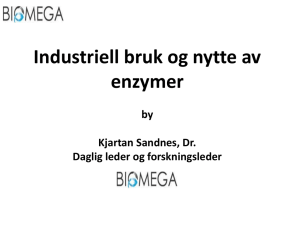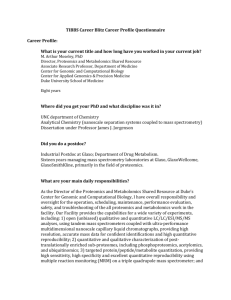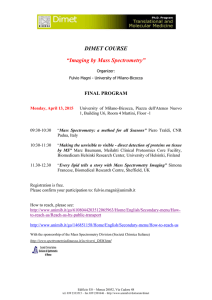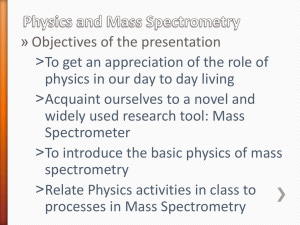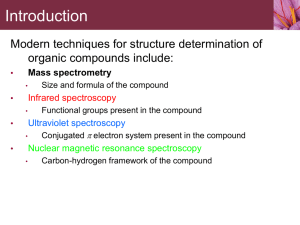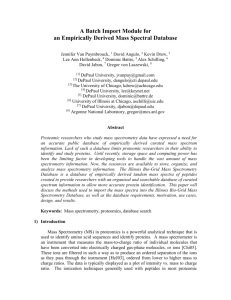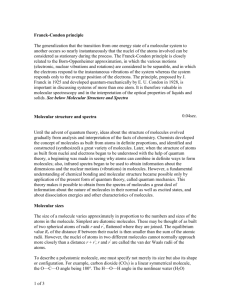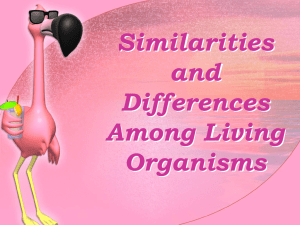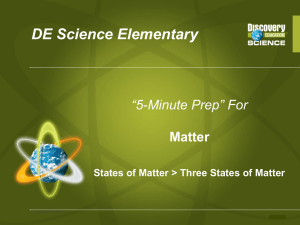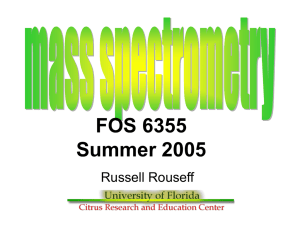Mass Spectrometry
advertisement
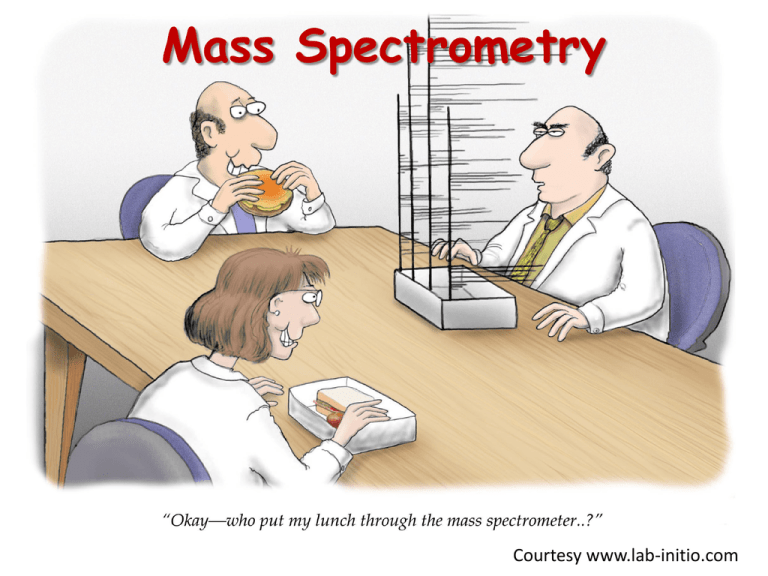
Mass Spectrometry Courtesy www.lab-initio.com Purpose of Mass Spectrometry Produces spectra of masses from the molecules in a sample of material, and fragments of the molecules. Used to determine the elemental composition of a sample the masses of particles and of molecules potential chemical structures of molecules by analyzing the fragments the identity of unknown compounds by determining mass and matching to known spectra the isotopic composition of elements in a molecule Stages The ionizer converts some of the sample into ions. Mass analyzers separate the ions according to their mass-to-charge ratio. The detector records either the charge induced or the current produced when an ion passes by or hits a surface Mass Spectrometry Methods Ionization method Typical Analytes Sample Introduction Mass Range Electron Impact (EI) Relatively small volatile GC or liquid/solid probe to 1,000 Daltons Chemical Ionization (CI) Relatively small volatile GC or liquid/solid probe to 1,000 Daltons Electrospray (ESI) Peptides Proteins nonvolatile Liquid Chromatography or syringe to 200,000 Daltons Carbohydrates Organometallics Peptides nonvolatile Sample mixed in viscous matrix to 6,000 Daltons Peptides Proteins Nucleotides Sample mixed in solid matrix to 500,000 Daltons Fast Atom Bombardment (FAB) Matrix Assisted Laser Desorption (MALDI) http://www.chem.arizona.edu/massspec/intro_html/intro.html Mass Spectrum of CO2 Molecular ion peak [CO2]+ = 44 Fragment Peaks [C]+ = 12 [O]+ = 16 [CO]+ = 28 Mass Spectrum of Bromine, Br2 Bromine has two isotopes: 50.69% 79Br and 49.31% Molecular Ion Peaks [79Br81Br]+ [79Br79Br]+ Fragments 79Br+ 81Br+ [81Br81Br]+ 81Br Practice: Methyl Bromide, CH3Br Answers: Methyl Bromide, CH3Br [CH381Br]+ [CH81Br]+ and [CH379Br]+ [CH281Br]+ [CH3 ]+ [C81Br]+ and [CH279Br]+ [CH79Br]+ [81Br]+ [79Br]+ [C79Br]+ Practice: Methylene Chloride (CH2Cl2) Chlorine is 75.77% 35Cl and 24.23% 37Cl Practice: Vinyl Chloride (CH2CHCl) Chlorine is 75.77% 35Cl and 24.23% 37Cl Spectra of Larger Molecules Spectra of large molecules have many fragments, and the interpretation of their spectra is beyond the scope of this course. Codeine, C18H21NO3 Toluene ( C7H8) Fragmentation **Note that the molecular ion peak is NOT the dominant peak in the spectrum Mass Spectrometry in Forensics Mass spectrometry is used to confirm the identify of unknowns, such as illegal drugs Unknowns are often not pure, and must be separated from a mixture Gas chromatography is used to separate the components of the mixture Mass spectrometry “fingerprints” the components, so that they can be matched to existing known spectra Mixture Gas Chromatograph Mass Spectrometer
